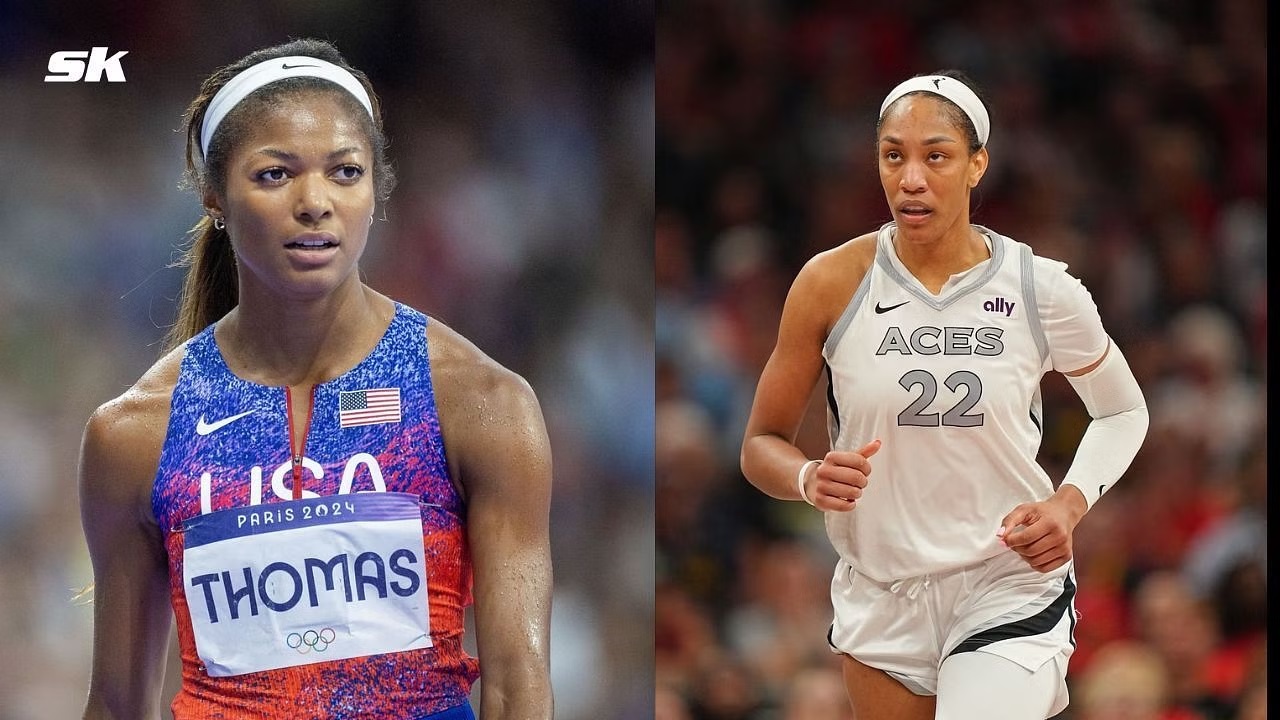Gabby Thomas extends support to A’ja Wilson amidst hate for confession about increased criticism of black players
Gabby Thomas Defends A’ja Wilson Against Online Hate, Calls for Change in Athlete Treatment
In the digital age, social media has become a platform where athletes not only showcase their talents but also express their views and connect with fans. However, it’s also a place where negativity and criticism can quickly spiral out of control. Recently, track star Gabby Thomas took to Instagram to stand in solidarity with basketball star A’ja Wilson after Wilson faced an onslaught of hate comments. The Paris Olympics gold medalist expressed her support for Wilson’s stance and called out the toxic nature of some of the remarks directed at the WNBA MVP. Her response has sparked conversations around the treatment of athletes in the digital space and beyond.
In her post, Gabby Thomas thanked Wilson for speaking up on the issue, writing: “Comments on this post are wild. Thank you A’ja Wilson for speaking on this.” The message was simple but powerful, emphasizing both her support for Wilson and her dismay at the negative comments that had flooded Wilson’s social media. Thomas’ decision to publicly back Wilson highlights a growing trend of athletes defending each other and calling out the abuse they often face online, especially from anonymous critics.
The Incident: A’ja Wilson and the Hate Comments
A’ja Wilson, a star forward for the Las Vegas Aces and a two-time WNBA MVP, has consistently been one of the league’s most vocal advocates for social justice, mental health, and equity in sports. Recently, she found herself at the center of a controversy that unleashed a barrage of hateful comments on her social media. The specifics of the situation may have varied, but the overarching theme was all too familiar: an athlete of Wilson’s caliber speaking out on a sensitive issue, only to be met with vitriol.
Wilson’s post had touched on a subject that clearly struck a chord, and as often happens in the online world, responses ranged from supportive to outright hostile. For female athletes, particularly women of color, this kind of backlash is unfortunately common. The hate directed at Wilson likely stemmed from her outspokenness, which, despite being part of the larger conversation around athletes using their platforms for good, often draws intense scrutiny.
Seeing the flood of negative comments, Gabby Thomas felt compelled to respond. As someone who has faced her own share of criticism as a high-profile athlete, Thomas’ empathy was apparent. Her words of gratitude toward Wilson for addressing the matter showed not only solidarity but also a recognition of how difficult it can be to face public criticism and hate simply for speaking one’s truth.
Gabby Thomas’ Stand: Athletes as Advocates
Gabby Thomas is no stranger to standing up for what she believes in. Since winning gold in the 200-meter race at the 2024 Paris Olympics, Thomas has used her platform to speak on a variety of issues, from social justice to mental health. She’s part of a new generation of athletes who are not just defined by their performances on the field or track but by their voices off it.
Her decision to support Wilson publicly speaks volumes about the unity among athletes today, especially women in sports. Athletes like Thomas and Wilson are breaking the mold of the traditionally silent sports star, who, in the past, might have been encouraged to stay quiet on social or political issues. Instead, they are leading conversations and sparking change.
For Thomas, stepping into this conversation wasn’t just about backing a fellow athlete but about calling attention to the broader issue of how athletes, especially female athletes, are treated online. The hate Wilson received is not unique—female athletes are often subjected to disproportionate amounts of vitriol and abuse on social media. Many studies have shown that women in sports experience more online harassment than their male counterparts, a reflection of the gendered expectations and biases that still persist.
Social Media and the Athlete’s Burden
Social media offers athletes like Thomas and Wilson an opportunity to engage with their fans and create personal brands. But the double-edged sword is that it also opens them up to a level of scrutiny that is both invasive and harmful. The anonymity of the internet allows people to express opinions in ways they might never dare in person, often resorting to hateful language or personal attacks.
For female athletes, the challenge is even greater. They not only have to prove themselves in their respective sports but also navigate a social space that can be hostile and unwelcoming. From sexist comments to racist abuse, the hurdles they face off the court or track can sometimes feel just as exhausting as the physical demands of their careers.
A’ja Wilson, being one of the most visible faces in the WNBA, has borne the brunt of this toxic culture. Her outspokenness on issues like pay equity in women’s sports, the fight for racial justice, and her candid discussions about mental health have made her a target for those who feel threatened by powerful, vocal women.
Thomas’ response to the situation serves as a reminder that athletes are not immune to the harsh realities of social media. In fact, they often face more scrutiny than most people, simply because of their public stature. Her call to action—thanking Wilson for her courage and calling out the hate—is a powerful statement in itself. It’s a reminder that athletes are not just there for our entertainment; they are human beings with thoughts, emotions, and, importantly, voices.
Moving Forward: The Role of Fans and Media
Gabby Thomas’ support of A’ja Wilson points to a larger issue that needs to be addressed: how we, as a society, treat athletes. In a world where social media platforms are filled with anonymous users hurling insults, it’s easy to forget that the people we follow and admire online are real individuals. Athletes like Thomas and Wilson are at the top of their game physically, but that doesn’t mean they should have to endure personal attacks just for speaking their minds.
The media also plays a role in shaping these conversations. While athletes are more empowered than ever to share their voices directly with fans, the way their messages are framed in the media can either fuel the fire of controversy or help defuse it. The narrative around athletes, particularly women, needs to shift. Instead of focusing on their appearance, mistakes, or their opinions as points of contention, we should celebrate their accomplishments and acknowledge their right to express themselves.
Ultimately, Gabby Thomas’ message is about more than just supporting A’ja Wilson. It’s a call for change in how we interact with athletes online, how we handle criticism, and how we treat the people who entertain and inspire us. It’s about ensuring that the same platform that gives athletes a voice isn’t used to tear them down.



